
Aug 10
1874 Birth: Herbert Hoover
Future President Herbert Hoover is born on this day in 1874 in West Branch, Iowa. After being tragically orphaned at the age of nine, Hoover lived with his uncle, attended Quaker schools and then graduated from Stanford University with a degree in engineering.
Hoover and his wife Lou went to China in 1899, where he worked as an engineering consultant for the Chinese government. The next year, Chinese nationalists rebelled against European colonial control and besieged westerners living in the city of Tientsin. During the siege, Hoover led an enclave of westerners in building barricades near their residential section of Tientsin. One story about this dramatic event has Hoover narrowly escaping with his life while attempting to rescue some Chinese children caught in the crossfire of urban combat one day during the month-long siege.
After an international coalition of troops rescued the Hoovers and spirited them and other westerners out of China, Herbert Hoover was made a partner at Bewick, Moreing and Co. He and Lou split their time between residences in California and London and traveled the world between 1901 and 1909. They then returned to the U.S. and, after serving as secretary of commerce under Presidents Warren Harding and Calvin Coolidge from 1921 to 1924, Hoover headed the American Child Health Association and served as chairman of the Federal Street and Highway Safety Commission. During World War I, Lou chaired the American Women's War Relief Fund and worked on behalf of other war-related charitable organizations. Both Hoovers, inspired by their experience in China, were active in helping refugees and tourists stranded in hostile countries.
In 1928, Hoover ran for president and won. Remarkably, it was his first election campaign—he had been appointed to his previous government positions. During the 1928 campaign, Hoover optimistically asserted that America was on the verge of snuffing out poverty and said "the poorhouse is vanishing from among us." Despite his warnings against market speculation, the great stock market crash of October 1929 occurred less than a year into his presidency. Hoover's tenure was thereafter associated with his inability to lead the nation out of the Great Depression and the couple's reputation was soon tarnished by Hoover's ineffective leadership and Lou's ostentatious White House social functions, which appeared heartless, frivolous and irresponsible at a time when many Americans could hardly make ends meet. As the Depression deepened, a growing number of shanty towns full of destitute unemployed workers sprang up in city centers; they became known as "Hoovervilles." Still, Hoover resisted implementing the type of emergency government relief programs advocated by his 1932 presidential campaign opponent, and ultimate successor, Franklin Delano Roosevelt.
After his tenure in the White House, Hoover worked as an advisor for economic and humanitarian relief programs. In 1947, he worked closely with then-President Harry Truman to combat worldwide famine and to help European nations with post-World War II reconstruction.
Hoover died of heart failure on October 20, 1964, in New York City. His beloved wife Lou had died 20 years before, in 1944. (History.com)
1884 Death: Franziska Hitler (Alois Hitler's second wife):
Klara Poelzl (1885-1903), Adolf's mother, was already pregnant by Alois Hitler with the first of her 6 children and she was married to Alois the following year.
1904 Russian-Japanese War: Russo-Japanese War: The Battle of the Yellow Sea, the "first exchange of fire between modern battleships," occurs as the Russian First Pacific Squadron steams out of Port Arthur to engage the Japanese fleet blockading the port. Tactically, the battle ends in a draw, but strategically the battle is a Japanese victory, since the Russian fleet never again attempts to break out into the open sea. The importance of this first exchange of fire between modern battleships [Battle of the Yellow Sea] was recognized at once by the two belligerents, and there is evidence that both Russian and Japanese naval architects had decided before the end of 1904 that the 12-inch gun was the only weapon likely to prove decisive in future fleet actions, that the intermediate calibers uselessly absorbed space, weight, and personnel that could be better used for more big guns, and that the "splash" from the smaller shells only served to blanket the target and confuse spotting. .... But before the end of 1904, Japanese plans were complete for their own first all-big-gun ships (Satsuma, above), and it was later discovered, with considerable astonishment, that the first of these was actually laid down at the navy yard at Kure in March 1905, some three months before Tsushima was fought, and long before the keel plate of the Dreadnought herself was laid at Portsmouth. Until 1905, only light craft had been built by the Japanese themselves, all their battleships having been constructed in foreign yards. The gun-power of this revolutionary battleship was...12-inch guns, in four pairs arranged in four double and four single turrets: with a total big-gun armament three times heavier than that of any existing battleship, and with a broadside 50 percent more powerful. Her speed of 20 knots was also at least two knots higher than that of the fastest battleship afloat. Only in her armor belt, of nine inches, did she fail to match up to Cuniberti's ldeal.
In fact the Japanese Aki (above) was beset with all manner of constructional difficulties and hindrances, and was not completed until 19121, when the Dreadnought had become a commonplace among the great naval powers. Nor was she, finally, a pure Dreadnought type. Within three months of her being laid down, Japan was victorious, and close to bankruptcy. There was delay in delivery of her machinery from America, and only four 12-inch guns could finally be found for her. In place of the eight 12-inch (guns) in her beam turrets, the Japanese therefore substituted twelve 10-inch guns; giving the Aki a most formidable total armament, while lacking the fundamental ordnance uniformity which was the main strength and whole raison d'etre of the Dreadnought type. 1913 The Treaty of Bucharest is signed between Bulgaria and the Balkan allies: Greece, Serbia, Montenegro, and Romania, thus ending the second Balkan war.
1914 War at Sea: German ships Goeben and Breslau reach Constantinople
After eluding their British pursuers—not once but several times—in a dramatic chase through the Mediterranean Sea, the German cruisers Goeben and Breslau safely anchor off the Dardanelles—the waterway connecting the Aegean Sea to the Sea of Marmara and the only passage from the Mediterranean to the Black Sea—at five o'clock on the afternoon of August 10, 1914, and are subsequently escorted by the Turks to safety in Constantinople.[For further information, Click here]
List Regiment: 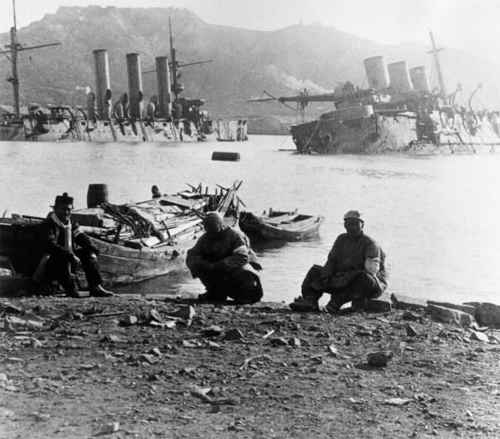
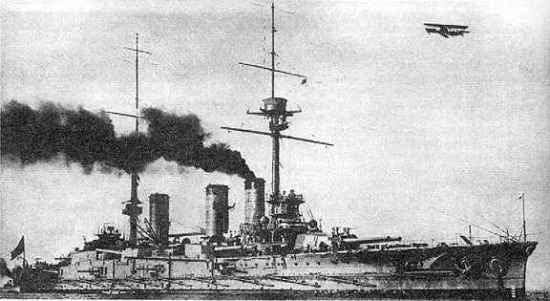
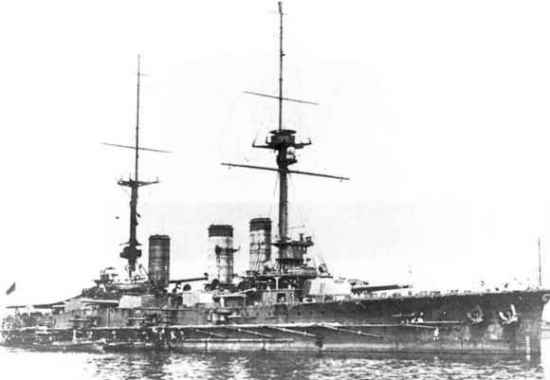

USA: Voluntary training:
General Leonard Wood sets up a military training camp in Plattsburg, New York. It will train 1,200 volunteers who pay for their own travel expenses, food and uniforms. By the summer of 1916, 16,000 men will be in unofficial military training. Note: General Wood was medically trained and was awarded the Medal of Honor during the Indian Wars while serving as an Assistant Surgeon in the Apache Campaign of the Summer of 1886. In 1895, he was the White House Physician to President Grover Cleveland. He began his long friendship with Theodore Roosevelt during his years in Washington. During the Spanish-American War he was the commander of the First Volunteer Cavalry (The Rough Riders): Roosevelt was his second-in-command. Following the war, he served as Military Governor of Cuba until 1902. As a Brigadier General he fought the Moros during the Philippine Insurrection in 1904 and less than a year later he was named Army Chief of Staff by President William Howard Taft (who he knew in the Philippines where Taft served as Civilian Governor). In less than a decade, he had jumped from a Captain in the Medical Corps to the highest post in the Army. He resigned that position in 1914. When World War I broke out, he became a vocal advocate for preparedness. He hoped to be Secretary of War, but was not appointed.
1916 World War I: Various: Captain Charles Fryatt
On 28 March 1915, a British merchant captain, and attempted, but failed, to ram and sink a German submarine, U-33 in the wake of repeated attempts by the German navy to sink his vessel, the Great Eastern Railway Steamer Brussels. Fryatt was however taken prisoner by the Germans on a subsequent voyage and charged with being a franc-tireur, a most serious charge, and one that carried the death sentence. Fryatt was tried and convicted by a German court and executed on July 27, 1916.
Official German Government Statement released this day:
It is only too intelligible that the English Government attempts to justify Captain Fryatt's action, for it is itself in a high degree a fellow-culprit. Captain Fryatt, acting as he did, acted only on the advice of his Government. The British Government's statement intentionally misleads the public. Captain Fryatt did not attempt to forestall an under-water attack, without warning, by the submarine. The U-boat was above water, and signalled to him when above water to stop, according to the international code of naval warfare. Therefore, he did not merely attempt to save the lives of his crew, because they were not endangered. Moreover, on March 28, 1915, Captain Fryatt allowed the submarine, which was approaching his ship for the purposes of examination, to draw up close, so as to ram her suddenly and unexpectedly, his object being to destroy her, and so gain the reward offered by the British Government. This act was not an act of self-defence, but a cunning attack by hired assassins. Captain Fryatt boasted of his action, though happily he failed to attain his object. This was brought home to him during the trial by witnesses from the crew of the submarine in question, whose evidence was against him. The British Parliament believed he had succeeded and praised his conduct, and the British Government rewarded him. The German War Tribunal sentenced him to death because he had performed an act of war against the German sea forces, although he did not belong to the armed forces of his country. He was not deliberately shot in cold blood without due consideration, as the British Government asserts, but he was shot as a franc-tireur, after calm consideration and thorough investigation. As martial law on land protects the soldiery against assassination, by threatening the offender with the penalty of death, so it protects the members of the sea forces against assassination at sea. Germany will continue to use this law of warfare in order to save her submarine crews from becoming the victims of francs-tireurs at sea."
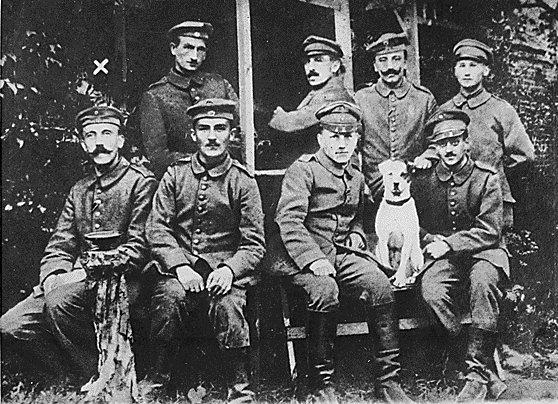
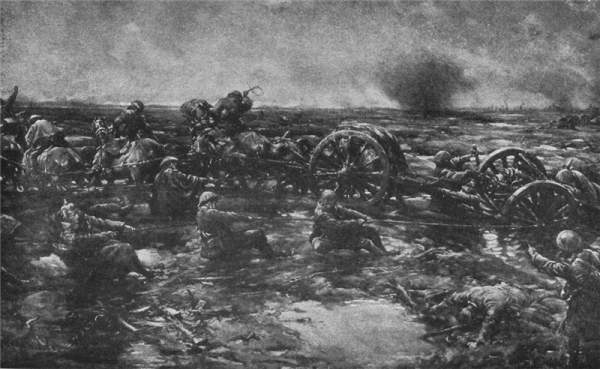
List Regiment (July 22-September 8):
Dispatch Runner Gefreiter Adolf Hitler serves at the front with 3 Company, 16 Bavarian Reserve Infantry Regiment during Phase 2 operations in Flanders. Most of their time in the trenches gas masks are worn, while English bombers attack, and tanks—a new terror witnessed for the very first time by most—attempt to advance over a long front through seas of mud. [For further details, Click here.]USA: Herbert Hoover is put in charge of the food program set up by the Lever Food and Fuel Control Act, which is designed to increase food production and distribution.
1918 World War I:Various:List Regiment (July 20-August 4):
Gefreiter Adolf Hitler's 16th RIR is tasked with building a new line of defenses on the site of the failed Second Battle of the Marne. [For further details, Click here.]General Pershing is permitted by the Allies to establish an independent American Army. He soon appoints Colonel George C. Marshall as his operations officer.
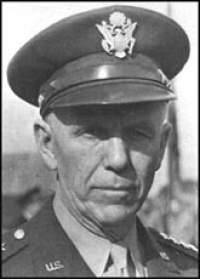
Marshall
Following America's entrance into the war, Wilson, after a short interview, named Pershing to command, a post which he retained until 1918. Pershing, who was a major general, was promoted to full general (the first since Philip Sheridan in 1888) in the National Army, and was made responsible for the organization, training, and supply of a combined professional and draft Army and National Guard force that eventually grew from 27,000 inexperienced men to two Armies (a third was forming as the war ended) totalling over two million soldiers.
1920 Various: Polish-Soviet War : The Red Army nears Warsaw; the collapse of Poland appears imminent:
Pilsudski
First two days of the operation Pilsudski spent among his troops encouraging them to the greatest effort. Only when on the third day he left for Warsaw to coordinate actions of armies attacking from the capital and from Wieprz River, the tempo of the pursuit lessen. Some units of the Soviet 4th and 15th Armies managed to cross Prussian frontier and avoid captivity. The Germans disarmed Russian troops but after transporting them to the Soviet border set them free. These troops took part in a Niemen Battle just few weeks later.
TheTreaty of Sèvres is signed between Turkey and the Allied powers, relieving Turkey of much of the land ruled by the Ottoman Empire and bringing the Ottoman Empire's rule to an end. The treaty was never adopted, however, and was superseded by the Treaty of Lausanne.
1930 Weimar: Rudolf Hess circles his M-23 Messerschmitt (painted with a black swastika) over a leftist meeting in Munich, drowning out the speakers. (THP)
1938
Holocaust: The Great Synagogue and Jewish community center in Nuremberg is demolished on Nazi orders. (THP)
Yes. In my Gau there were approximately 15 synagogues, in Nuremberg one main synagogue, a somewhat smaller one, and I think several other prayer rooms. The main synagogue stood in the outskirts of the medieval Reichsstadt. Even before 1933, during the so-called period of struggle, when we still had the other government, I stated publicly during a meeting that it was a disgrace that there should be placed in the Old City such an oriental monstrosity of a building. After the seizure of power I told the Lord Mayor that he should have the synagogue torn down and, at the same time, the planetarium.
The Army chiefs and the chiefs of the Air Forces groups, Lieutenant Colonel Jeschonnek, and I are ordered to the Berghof. After dinner the Fuehrer makes a speech lasting for almost 3 hours, in which he develops his political thoughts. The subsequent attempts to draw the Fuehrer's attention to the defects of our preparations, which are undertaken by a few generals of the Army, are rather unfortunate. This applies especially to the remarks of General Von Wietersheim, in which, to top it off, he claims to quote from General Adams that the Western fortifications can be held for only 3 weeks. The Fuehrer becomes very indignant and flares up, bursting into the remarks that in such a case the whole Army would not be good for anything. 'I assure you, General, the position will be held not only for 3 weeks, but for 3 years.' The cause of this despondent opinion, which unfortunately enough is held widely within the Army General Staff, is based on various reasons. First of all, it (the General Staff) is prejudiced by old memories and feels responsible also for political decisions instead of obeying and executing its military mission. That is certainly done with traditional devotion, but the vigor of the soul is lacking, because in the end they do not believe in the genius of the Fuehrer. One does perhaps compare him with Charles XII. And since water flows downhill, this defeatism may not only possibly cause immense political damage, for the opposition between the generals' opinion and that of the Fuehrer is common talk, but may also constitute a danger for the morale of the troops. But I have no doubt that this, as well as the morale of the people, will encourage the Fuehrer enormously when the right moment comes.
1939 Countdown to War: Various:
Danzig: The Warsaw government warns Germany that "any future intervention to the detriment of Polish rights and interests in Danzig will be considered an act of aggression."
Julius Schnurre head of the Economic Policy Department of the German Foreign Ministry, picks up discussions with Georgi Astakhov, Chargé d'Affaires of the Soviet Embassy, sounding out the possibility of a pact between Germany and the Soviet Union.
I . . . asked Astakhov whether he had any news from Moscow regarding the questions which had been discussed between us. Astakhov replied in the affirmative and stated as follows:
The question informally discussed between us, as to whether a political thought should be inserted in the preamble to the credit agreement, had also been examined in Moscow. It was held more appropriate not to connect the trade and credit agreement with language of a political nature. This would be anticipating the future. I replied to Herr Astakhov that this was our view, too. Astakhov then mentioned that he had once again received an express instruction from Moscow to emphasize that the Soviet Government desired an improvement in relations with Germany. The declaration he had made to me the last time was thereby strengthened. I took advantage of this in the ensuing conversation to tell Astakhov the following:
We had noted with satisfaction that the Soviet Government was anxious to continue the conversation regarding the improvement of Soviet-German relations. We had wished that Molotov would let us know his basic attitude in regard to the status of Soviet interests in order to facilitate further conversations and had believed that it was premature for us to discuss concrete problems so long as we did not know exactly the interests of the Soviets. But, in any event, one question was quite ripe, namely Poland. The Polish delusion of grandeur, shielded by England, drove Poland constantly to new provocations. We were still hoping that Poland would somehow come to reason, so that a peaceful solution could be found. Failing this, it was possible that, against our will and against our desires, a solution by force of arms would have to take place. If, as we had now done on various occasions, we had declared ourselves willing to enter upon a large-scale adjustment of mutual interests with Moscow, it was important for us to know the position of the Soviet Government on the question of Poland.
Delegates of the joint British-French military mission spend the day sightseeing in Leningrad.
Alfred Naujocks: a young SS secret-service veteran and member of the SD since its founding in 1934, is personally ordered by Reinhard Heydrich to prepare a fake Polish attack on the radio station at Gleiwitz near the Polish border. "Practical proof is needed for these attacks by the Poles for the foreign press as well as German propaganda," Heydrich tells Naujocks. (THP)
Night-time air war exercises are conducted over England on a larger scale than any time since World War I. 500 aircraft (bombers with fighter support) sweep in from the east to attack Birmingham, Rochester, Bedford, Brighton and Derby. 800 defenders take off to challenge the attackers. Defending forces are largely successful in beating off the attacking forces. Bombers approaching London have particular difficulty because of a balloon barrage above the capital. 1941 World War II: Various: Great Britain and the Soviet Union promise aid to Turkey
Holocaust: Various:
Yugoslavia: The Germans drive the 3,000 Jews of the Banat region from their homes and take them to the Tasmajdan camp near Belgrade, where they are shot in the camp itself, and on the banks of the Danube, in daily executions. (THP)
Poland (Aug 10-Oct 15) An estimated 150,000 Jews are murdered by the Germans and their collaborators during the liquidation of the ghettos in Wolyn. (THP)
1943 World War II: From an order signed by Himmler: "It is not the task of the police to interfere in clashes between Germans and English and American terror fliers who have bailed out."
1944 Various:
Germany: War against Japan: American forces overcome Japanese resistance on Guam. (AP)
1945 World War II: Japan accepts Potsdam terms, agrees to unconditional surrender:
On this day in 1945, just a day after the bombing of Nagasaki, Japan submits its acquiescence to the Potsdam Conference terms of unconditional surrender, as President Harry S. Truman orders a halt to atomic bombing.
Emperor Hirohito, having remained aloof from the daily decisions of prosecuting the war, rubber-stamping the decisions of his War Council, including the decision to bomb Pearl Harbor, finally felt compelled to do more. At the behest of two Cabinet members, the emperor summoned and presided over a special meeting of the Council and implored them to consider accepting the terms of the Potsdam Conference, which meant unconditional surrender. "It seems obvious that the nation is no longer able to wage war, and its ability to defend its own shores is doubtful." The Council had been split over the surrender terms; half the members wanted assurances that the emperor would maintain his hereditary and traditional role in a postwar Japan before surrender could be considered. But in light of the bombing of Hiroshima on August 6, Nagasaki on August 9, and the Soviet invasion of Manchuria, as well as the emperor's own request that the Council "bear the unbearable," it was agreed: Japan would surrender.
Tokyo released a message to its ambassadors in Switzerland and Sweden, which was then passed on to the Allies. The message formally accepted the Potsdam Declaration but included the proviso that "said Declaration does not comprise any demand which prejudices the prerogatives of His Majesty as sovereign ruler." When the message reached Washington, President Truman, unwilling to inflict any more suffering on the Japanese people, especially on "all those kids," ordered a halt to atomic bombing, He also wanted to know whether the stipulation regarding "His Majesty" was a deal breaker. Negotiations between Washington and Tokyo ensued. Meanwhile, savage fighting continued between Japan and the Soviet Union in Manchuria. (History.com)
1946 Nuremberg Tribunal: On the 200th day of the trial, Field Marshal Eric von Manstein testifies for the Defense: Dr. Hans Laternser (Counsel for the German General Staff and High Command of the Armed Forces): How did you, as a military leader, regard the war against Russia? You have been among those closest to me and we have known each other since our early youth. I therefore want to ask you to get together a collection of my work and to set down, for the future, some of what you know of my life. I think that one day it will be appreciated . . . . The essential points of my life; I think I'm entitled to be seen by posterity in a different light than all these repulsive bourgeois 'revolutionaries.' My idealistic attitude toward Hitler--for that is what it was--should here be described . . . . I know you will do it well. Perhaps it will even give you some satisfaction to thus complete your task as my official chronicler. In any case, I should be grateful to you. (Sereny) I have now finished writing my closing statement for the court. It ends a career which, after early years of anonomity gave me huge responsibility and fame and swept me to unimagined heights. It was a life which eventually turned an industrious responsible man into a traitor to the master he had faithfully served for ten years.
1945: Robert Hutchings Goddard dies of throat cancer in Baltimore, Maryland. He is buried in Hope Cemetery in his hometown of Worcester, Massachusetts. Goddard was credited with 214 patents for his work; 131 of these were awarded after his death. Dr. Goddard's final project at Annapolis was a small, pressure-fed liquid-oxygen gasoline rocket, possibly adaptable to a small guided missile. His exhausting work schedule began to affect his health, and brought back symptoms that seemed at first to point to his old lung trouble. For a time, he stubbornly kept on working despite a constant cough. Then after a while it became painful even to speak, and as much as possible he wrote out what he wanted to say. By the time his doctors persuaded him that he must go to the hospital, he seemed almost indifferent—too tired to care . . . .
1949 Truman signs National Security Bill:
President Harry S. Truman signs the National Security Bill, which establishes the Department of Defense. As the Cold War heated up, the Department of Defense became the cornerstone of America's military effort to contain the expansion of communism. [For further information, Click here]
1979 Death: Walter Gerlach: German physicist. He discovered the spin quantization together with Otto Stern in 1922. (Stern-Gerlach experiment-Electron spin) Suspected of involvement in the Nazi nuclear research programme, he was taken to the UK after the war for questioning to see if the Nazis had discovered how to make atomic weapons.
1988 Japanese-American internment: The Civil Liberties Act of 1988 became law, authorizing US$20,000 in reparations to each surviving internee. [For further information, Click here]
Edited by Levi Bookin (Copy editor) Click to join 3rdReichStudies Disclaimer: This site includes diverse and controversial materials--such as excerpts from the writings of racists and anti-Semites--so that its readers can learn the nature and extent of hate and anti-Semitic discourse. It is our sincere belief that only the informed citizen can prevail over the ignorance of Racialist "thought." Far from approving these writings, this site condemns racism in all of its forms and manifestations. 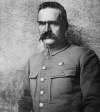
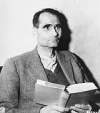
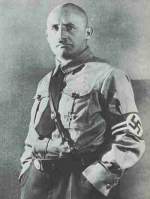
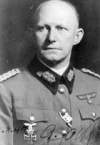
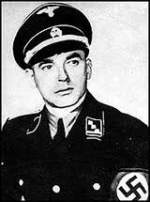
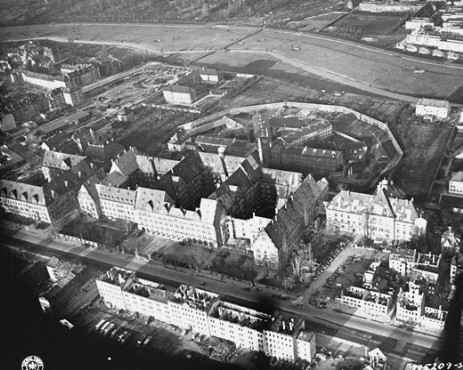
Field Marshal von Manstein: I considered the war against Russia to be a preventive war on our part. In my opinion, there was for Hitler no other way out of the situation into which he had brought Germany, after he had not dared to risk the, invasion of England in the autumn of 1940. In my opinion, we were forced to acknowledge that the Soviet Union was a very great threat in 1940 and 1941-a threat which would become real as soon as we finally tied up our forces in the fight against England. The only chance of extricating ourselves from that situation would have been a landing in England in the autumn of 1940, but that was a risk which Hitler did not take.
Dr. Laternser: How is it possible that the Commander-in-Chief of the Army and the Chief of the General Staff of the Army, in the most important military decisions, such as for instance a war against the Soviet Union, were bypassed by Hitler?
Field Marshal von Manstein: In my opinion that can be explained as follows: Politically we generals had not had any say for a long time, because the political objections raised by the generals, for instance on the occasion of the occupation of the Rhineland and the march into Czechoslovakia, had turned out to be without substance. Hitler had carried his point. He no longer concerned himself with political objections but only with military questions.
With regard to military matters, I was personally of the opinion, as I have just said, that the offensive in the West, from the point of view of the soldier, was an imperative necessity. The High Command of the Army was of a different opinion, and in this, to my thinking, they advocated the wrong military course. There again the results proved Hitler to be right, and it became apparent from his whole behavior that after that he thought that he knew more than the soldiers, so that on the decisive questions of the fight against the Soviet Union he carried his point and would no longer listen to the High, Command of the Army.
Dr. Laternser: You received the Commissar Order, did you not?
Field Marshal von Manstein: Yes.
Dr. Laternser: What attitude did you adopt with reference to that order?
Field Marshal von Manstein: It was the first time I found myself involved in a conflict between my soldierly conceptions and my duty to obey. Actually I ought to have obeyed, but I said to myself that as a soldier I could not possibly co-operate in a thing like that, and I told the commander of the army group under which I came at the time, as well as the commander of the armored group, that I would not carry out such an order, which was against the honor of a soldier.
In practice, the order was not carried out. My divisional commanders, who had already received the order independently from me in the Reich, shared my view and, apart from that, the commissars, as good fighters, defended themselves to the last and in many cases shot themselves before being taken prisoner, or they removed their insignia of rank and could not be identified by the troops. The troops, who inwardly disliked the order intensely, certainly did not look for commissars amongst the prisoners.
After all the momentous events of those years, nothing can be more indicative of what life had become than that, at the end, the only real decision left was whether to serve the people, or the Fuehrer, Adolf Hitler.
I am not writing this in an effort to justify myself . . . but . . . I feel the need to provide my wife and my children for their later lives with a clear understanding of events and a summary on many memories.
The limited time at my disposal, and the external circumstances will not allow me, stylistically or otherwise, to produce the kind of account I would ordinarily hope to present, but the main thing is, I'm sincere in my purpose. Albert Speer, Nuremberg, August 10, 1946, Prison, Cell 17. 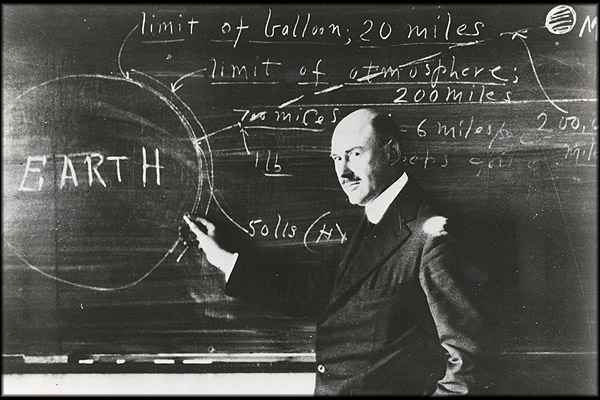
When the doctors operated, they found that cancer had attacked a larynx already weakened by the long-ago battle with tuberculosis. They hoped he could be made strong enough to withstand a second operation, but despite blood transfusions he grew more feeble.
Late one stifling night in August, when Mrs. Goddard had barely reached home from the day at her husband's bedside, a call came from the hospital. The night nurse said that Dr. Goddard seemed very restless and disturbed. He wanted his wife to come back at once, as there was something he must tell her. Hurrying back to the hospital, she found him too weak to speak. He recognized her, smiled, and fell back on the pillow, exhausted.
"I thought this might happen," whispered the nurse. "A little while after I called you I could see he was already too tired to talk. But he showed me he wanted his writing pad when I asked what he needed to see you about." Mrs. Goddard took the note pad and read the words: 'About a thousand things!' 
levi.bookin@gmail.com










Fair Use Notice: This site may contain copyrighted material the use of which has not always been specifically authorized by the copyright owner. We are making such material available in our efforts to advance understanding of historical, political, human rights, economic, democracy, scientific, environmental, and social justice issues, etc. We believe this constitutes a "fair use" of any such copyrighted material as provided for in section 107 of the US Copyright Law. In accordance with Title 17 U.S.C. Section 107, the material on this site is distributed without profit to those who have expressed a prior interest in receiving the included information for research and educational purposes. If you wish to use copyrighted material from this site for purposes of your own that go beyond 'fair use', you must obtain permission from the copyright owner.
Please Note: The list-owner and moderators of 3rdReichStudies are not responsible for, and do not necessarily approve of, the random ads placed on our pages by our web server. They are, unfortunately, the price one pays for a 'free' website.



